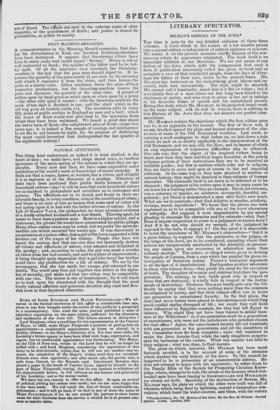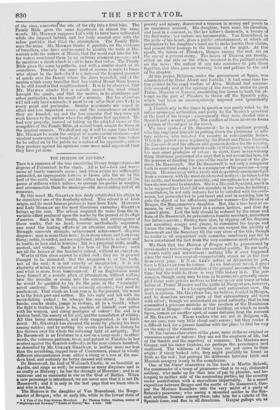LITERARY SPECTATOR.
MILMAN'S HISTORY OF THE JEWS.° THE time is gone by for any detailed criticism of these three volumes. A work which in the course of a few months passes into a second edition is independent of critical applause or censure. We notice it on the present occasion chiefly because of the con- troversy which its appearance originated. The book itself is an important addition to our literature. We are not aware of any history of the Jews, which, with the compression that such a form of publication necessarily called for, gives so lucid and so complete a view of that wonderful people, from the days of Abra- ham the father of their race, down to the present times. Mr. MiemAre has bestowed on his undertaking great labour and re- search, both very successfully. The style might be mended. We cannot call it bombastic, much less is it flat or vulgar ; but it is evidently that of a man whose ear has long been tuned to the rhythmus of poetry, and who even in prose is too apt to indulge in his favourite forms of speech and his accustomed pauses. Bating this fault, which Mr. MILMAN, in his projected larger work on the same subject, will do well to correct, there is nothing in this History of the Jews that does not deserve our perfect com- mendation.
Mr. MILMAN notices the objections which the first edition gave rise to, in an appendix to the second. The first of these was, it seems, levelled against his plain and honest statement of the cha- racters of some of the Old Testament worthies. Last week, in noticing a work analogous to that before us, we laid down a rule which we look on as strictly applicable to the interpretation of the Old Testament, and we may add, the New, and by means of which an easy explanation of numerous difficulties may be obtained. Our rule was, that the object of the inspired writers being to teach men their duty here and their hopes hereafter, in the purely religious portion of their instructions they are to be received as infallible guides ; but that in matters which refer not to religion, they are liable to error, and open of course to fair and impartial criticism. In the same way as they were deceived in matters of natural history, they might be deceived in their estimate of human character. The character itself is set down to be followed or to be shunned ; the judgment of the writer upon it may in many cases be set down for a warning rather than an example. David, for instance, was a suborner of murder, an adulterer, revengeful, deceitful, un- grateful; yet David is denominated a man after God's own heart. What are we to conclude—that God delights in murder, adultery, revenge, deceit, ingratitude ? We know that the phra'se has been explained so as to be compatible with one of the worst characters of antiquity. But suppose it were impracticable by any special Pleading to reconcile the character and the estimate—what then? Does it require inspiration to come to a judgment on known facts? And if it do not, why should we scruple, if the judgment be opposed to the facts, to impugn it ? On this point it is impossible to resist the soundness of Mr. MILMAN'S observation—" that it is a, pious fallacy, to suppose that the patriarchs, or the judges, or the kings of the Jews, are to be considered, excepting where their actions are unequivocally sanctioned by the Almighty, as possess- ing any claim upon our reverence or admiration more than ordinary mortals." The orders, or alleged orders given to destroy the people of Canaan, form a case which has puzzled the pious in- vestigators of Scripture history PALEY'S analogical argument is on the face of it unsatisfactory. Earthquakes awaken reverence in those who witness theni—they purify the mind for the reception of truth. The slaughter of women and children brutalizes the per- petrators. The analogy, in fact, holds good only in respect of those that are destroyed ; it wholly fails in respect of the instru- ments of destruction. Professor MILMAN hardly gets over the dif- ficulty by saying that they were nothing more than the common development of society, and that their utmost effect was to leave one generation in unreclaimed ferocity. In the first place, the Jews had never before been placed in circumstances in which they could exhibit similar disregard of life ; nor could they well have been influenced by Egyptian example, for they had left Egypt in infancy. Why might they not have been trained to milder man- ners in the Wilderness ? or, if one generation must be a generation of executioners, why were not the unbelievers who perished chosen for that office ? Again, the unreclaimed ferocity did not terminate with one generation or ten generations, and yet the slaughters of the Canaanites were far from complete ; enow still remained to make the Jews forsake God, while the early slaughters perpetu- ated the barbarism of the victors. What was undone was fatal to their religion ; what was done, to their morals. The point on which, however, Mr. MILMAN has been most furiously assailed, is in his account of some of the miracles which marked the early history of the Jews. To this assault he happened to be in possession of an unanswerable defence. He does not attempt to argue with his opponents ; he refers them to the Family Bible of the Society for Promoting Christian Know- ledge, where, strange to be told, the whole of the heresies which hot- headed men have been tracing to ROSENIAULLER and MICHAELIS are clearly set forth. Speaking of the destruction of Sodom, Mr. MILMAN says, the plain on which the cities were built was full of bitumen, which being fired by lightning, caused a tremendous con- vulsion, which burst the water-courses, and these, with the waters
• Family Library. No. IX. History of the Jews. By the Rev. H. Milman. Second edition. 3 vols. London, IWO.
of the river, .convertehhe site of the city into a fetid lake. The Family Bible gives the same hypothesis in almost the same words. Mr. Miassasi supposes Lot's wife to have been suffocated while she lingered behind, and her body crusted over with the saline particles that filled the atmosphere. The Family Bible says the same. Mr. MILMAN thinks it possible, on the evidence of travellers, who have endeavoured to identify the wells at Ho- warrah with the waters of Marah, that the wood cast into the bit- ter waters sweetened them by an ordinary chemical process ; and he mentions a shrub which is said to have that virtue. The Family Bible gives the same hypothesis, and with a similar doubt of its soundness. Precisely the same kind of answer is made to those who object to the fact—for it is a fact—of the frequent passage of quails over the Desert where the Jews travelled, and of the manna which every traveller that has visited Mount Sinai knows to be still found in that neighbourhood. It is to be observed, that Mr. MILMAN admits that a miracle caused the wind which brought the quails, and that the manna, in its abundance and other particulars, was the result of a miracle. But his object; as will not only have a miracle, it must be one after their own taste in every point and particular. Similar arguments are urged in other and less important cases ; and the coincidences on which they are founded, are not the less singular that they were not even known to the author when the objections first appeared. He had very properly, instead of taking up the adopted views of the compilers of the Family Bible, at second hand, sought for them in the original sources. We shall not say it will be some time before Mr. MILMAN be again the subject of controversial virulence—for virulent controversy is long-lived ; but it will be some time before he be called on by the public for a notice of his opponents, unless they produce against his opinions some more solid argument than they have yet done.



























 Previous page
Previous page